Bayern is the champ of mid-week fixtures
Every fall and spring the German newspapers and websites covering sports are filled with articles about the following debilitating „English weeks“. They often draw the conclusion that the top-tier teams of the Bundesliga suffer throughout those weeks packed with several matches. This article shall evaluate how multiple challenges affected the success of Bayern in the past.
On Saturday night the top match against arch nemesis Dortmund on their turf, on Wednesday in Rostow with an uncommon kickoff time and finally another top match at home against Leverkusen on the following Saturday – this seemingly logistical and preparational nightmare was scheduled for Bayern Munich last year in November.
The multiple challenges from Bundesliga, DFB Pokal and Champions League matches not only take their toll on the players, but also are quite often used by the media to offer clubs, which are going through a little crisis, an alibi for their mediocre performances in early summer.
By regularly finishing top-notch in the Bundesliga, Bayern has to play a lot of mid-week fixtures through the year. But are those multiple challenges an actual disadvantage or is Bayern actually best after back-to-back games? How many points does Bayern surrender on the weekend of an “English week” and how are they affected by road trips?
Does the outcome of the mid-week game affect the performance of the weekend matchup or are the players less motivated after a game in Mailand or Madrid, when they have to face Ingolstadt or Darmstadt on Saturday? All these questions shall be analyzed carefully in this article.
In order to have a resilient data source the last 22 seasons of Bayern (going back to 1995/96) have been included. For each season the points following an “English weeks” and the points without a previous mid-week fixture were evaluated.
It has to be mentioned, that these numbers don’t take into account the individual strength of each opponent. This factor can only be compensated by the large data base. In order to rate the performance of the national competition, the biggest rivals of the last five years – Borussia Dortmund, FC Schalke, VfL Wolfsburg, Bayer Leverkusen and Borussia Mönchengladbach – have been assessed by the same methodic over the last five seasons.
How often do they play an “English week”?
In each of the last five seasons Bayern reached at least the semi-final of both the national cup and the Champions league. Furthermore the Bundesliga has adapted to the British Premier League and has scheduled more mid-week fixtures in order to shorten the season a little bit. This suggests that Bayern played their most “English weeks” in the last few seasons. And indeed the Reds had on average 18 back-to-back games per season.
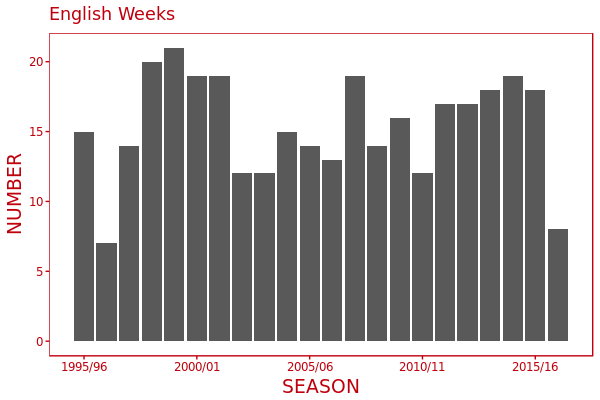
(Visual: Lukas)
However, two other time periods stand out over the last 22 seasons: In 2007/08, when Bayern “only” played in the Euro-League, they had 19 mid-week-fixtures due to the inflated schedule of this competition. What seems more surprising though is the four-year period right around the turn of the century, when Bayern had on average 20 “English weeks” per season.
This was not only due to Bayern reaching the Champions League final twice during that stretch but also because of the Champions League modus back then, which included a second group stage instead of a round of sixteen and a quarter final and therefore had more games.
Over the 22 years covered, the German record champion played on average 15 “English weeks”, which sums up to almost half a season.
Does Bayern drop points after “English weeks”?
If basically every second match is a follow-up to a mid-week fixture, one can’t give up too many points in comparison to matches without an “English week” or otherwise the success in the national league is at stake. This was mastered by FC Bayern throughout the last 22 seasons with almost frightening consistency.
In the analyzed period of time the Munich lads actually got more points following an “English week” (2.19) than without a previous mid-week fixture (2.12).
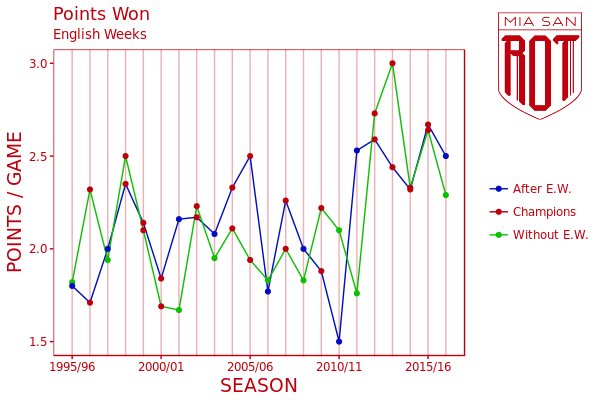
(Visual: Lukas)
In this diagram the points scored are broken down by each individual season. Throughout the 22 evaluated seasons, Bayern finished twelve times with more points after an “English week”. Seasons which had Munich finishing atop the table are highlighted in red.
On first glance there seems to be no connection between the number of points after a mid-week fixture and winning the league title. But with a defined threshold of two points per game a conclusion can be drawn. If Bayern managed to pass this limit on games after an “English week” they were crowned league champion in ten of thirteen cases, while if they failed to reach this threshold the number of league titles drops to three out of eight seasons.
Furthermore, it is no surprise that if Bayern’s point average for games with and without a previous mid-week fixture is above those fateful two points per game they won the league title every time. By the way, Bayern is currently on pace to achieve that feat in the 2016/17 season.
It is however remarkable that Munich managed to achieve this two point average in each of the last four seasons. They last failed to do so in the traumatic “Finale dahoam”-season in 2011/12, when they finished second in every competition. Back then the point score after a mid-week fixture was not a problem, but rather the amount of points scored after having a “free” week.
The point differential then was the biggest of the covered 22 seasons at +0.79. A similarly big differences was achieved in the previous season (-0.60), when the Reds only averaged 1.50 points after an “English week”, which is also the worst outcome throughout all 22 seasons. No wonder they finished just fourth in the league that year.
How strong is the impact of road trips?
In order to evaluate whether the team rather spends their “English week” in the domestic Allianz-Arena or on the plane from London to Berlin, all matches were categorized into four groups: mid-week and weekend fixture at home, mid-week fixture at home and an away game on the weekend, mid-week fixture away and the weekend fixture at home, both games as away games.
The corresponding point turnout is presented in the following graphic.
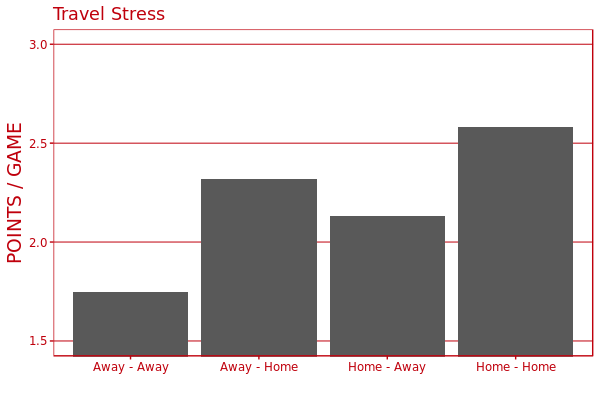
(Visual: Lukas)
It is clear, that the combination of two home games is best as Bayern averaged 2.58 points on those occasions. This comes to no surprise as the stress level is the lowest for players. There were a total of ten seasons were Bayern won all of their home-home games.
This comparison is distorted, of course, by the fact that Bayern in general have a higher points-average for home games than away games. In all 22 seasons, Munich averaged 2.42 points on home turf while only averaging 1.97 points away from home.
This explains why the combination away-home, which is connected with longer travels as Bayern probably played an international game mid-week, has a higher average than the home-away combination that usually comes with shorter travels. However, one can still conclude that an away game is a bigger disadvantage than playing an “English week”.
Solely the combination away-away can be clearly identified as the worst case, as Bayern’s average drops to 1.75 points, still a point average, which most other teams are dying to achieve as covered later in this article. The greater strains of travel as well as the lack of home support take their toll on the point average on those away-away combinations.
Does the midweek result have an impact on the next game?
Finally the question of mentality shall be brought up in this section. Do the players draw motivation from a mid-week loss and try to turn the tide on the following weekend or do they go into cruise-control after a victory on Wednesday and also win the weekend fixture? Do they lack the crucial few percents after an outstanding performance in Paris on a weekday?
In order to evaluate this, all games were categorized once more. On the one hand all games were sorted by matches after a victory, tie or defeat mid-week, on the other hand they were organized on whether they followed an Champions League, Bundesliga or cup fixture.
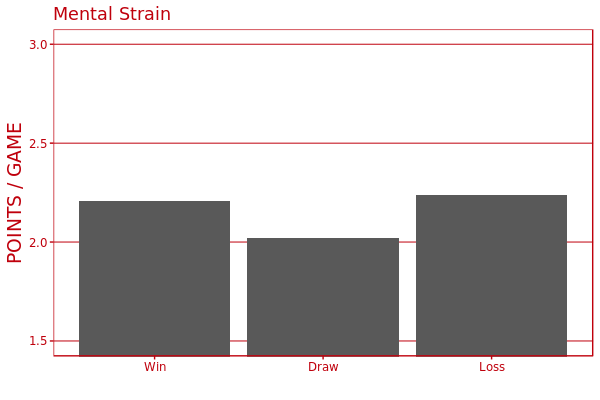
(Visual: Lukas)
As seen in the diagram, Bayern surprisingly averages the most points after a previous mid-week loss at 2.24 points per game. However, the difference to games after a mid-week victory at 2.21 points per game is only marginal.
One can still draw the conclusion that the Bavarians manage to turn the tide after a mid-week defeat and show an act of defiance on the following weekend, which seldom traps them in a downward spiral. By the way, the points per game after a tie are still more than two victories out of three matches.
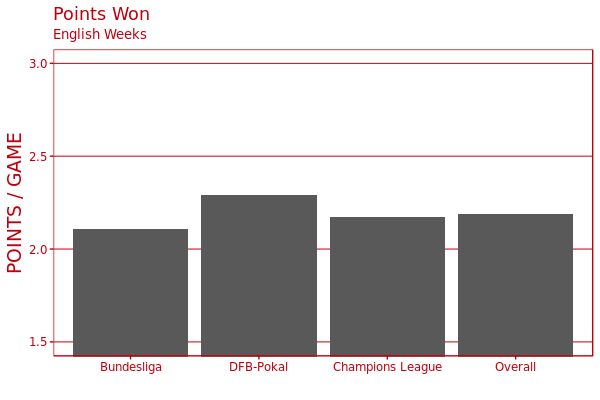
(Visual: Lukas)
In this diagram it is shown, whether Bayern played their weekend match following a Champions League, a Bundesliga or a cup fixture and how that affected their point average.
It has to be concluded, that there is no clear difference. After a cup match the point average is a little higher and after a league game it is a little lower. However, this is also affected by the fact that only 65 respectively 38 of a total 338 “English weeks” were after a mid-week cup or league game. This leads to an increased statistical variance in comparison to the matches following a Champions League game. Over the course of 235 games the point average after a Champions League match is almost the same as the overall average.
Do the Bundesliga rivals perform differently?
As outlined in the previous sections, there is a relation between the point average after an “English week” and national success. This leads to the assumption that the national competition can’t compete with FC Bayern as long as they themselves have to play “English weeks” on a regular basis. This hypothesis shall be tested in the following section.
In order to do so the biggest rivals of Bayern Munich have been evaluated over the last five seasons. As a comparison the performance of Bayern over the total 22 seasons and especially the last five seasons are listed.
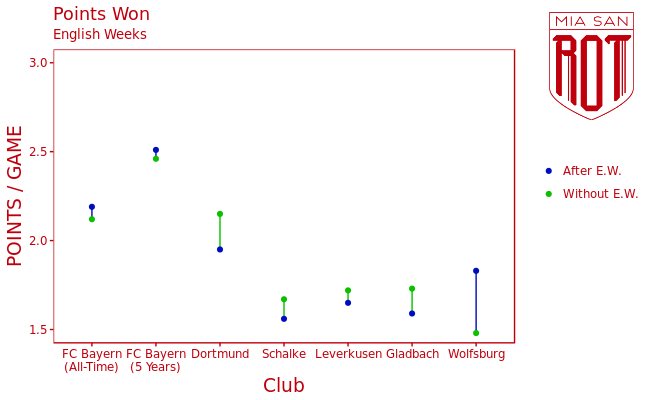
(Visual: Lukas)
One can see that no team can keep up with the Bavarians in regard to point average after mid-week fixtures. Borussia Dortmund is closest, with a point average of 1.95 after playing an “English week”. The 2014/15 sticks out as Dortmund only averaged 0.92 points – a year that immensely lowers their average. At 2.15 points per game on matches without a previous mid-week fixture, Dortmund basically matches the average of Bayern over the complete 22 seasons.
While Dortmund contests in 15.2 “English weeks” on average per season, the other teams fall behind in both number of mid-week fixtures and the point averages. Of the remaining teams Leverkusen has the most “English weeks” at 13.0, followed by Schalke. Wolfsburg and Gladbach both had seasons without international matches, so their average is even lower.
Schalke, Leverkusen and Mönchengladbach have point averages between 1.56 and 1.73 points per game. All of the above have a slightly higher point average in weeks without a mid-week game as opposed to “English weeks”. However, the 1.73 points per game is still less than the point average of Bayern after an away-away combination, the one that was identified as worst-case earlier.
The point average of all teams is almost equal no matter whether they had a mid-week fixture or not. However, the level is quite a bit lower than the Bayern level or the Dortmund level for that matter.
Wolfsburg is the only team outside of Bayern that manages to average more points after an “English week” than on weeks without a mid-week match. This can at least in part be traced back to small sample size of just 40 evaluated games.
The statistics seem to support the given hypothesis. No other teams over the last five seasons have a point average remotely close to Bayern’s. Even by increasing the sample size of Bayern games to the last 22 seasons the edge over Dortmund is still comfortably at 0.2 points per game. Out of these five teams, only Dortmund can compete with Bayern on the long-run. All other teams are way behind.
Lessons learned
- Over the course of 22 seasons, Bayern averaged slightly more points when playing an “English week” as opposed to not playing one. There is a relation between the points scored after a mid-week fixture and national success.
- The strains of travel play a small role, but statistically an away-game is still a bigger disadvantage than an “English week”.
- Furthermore, the outcome of the mid-week fixture has little to no effect on the lads’ performance on the weekend.
- Finally, the hypothesis was proven that out of all teams with multiple challenges FC Bayern by far has the best point average in “English weeks” and can only be threatened by Borussia Dortmund.









